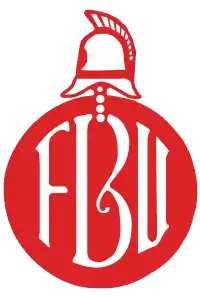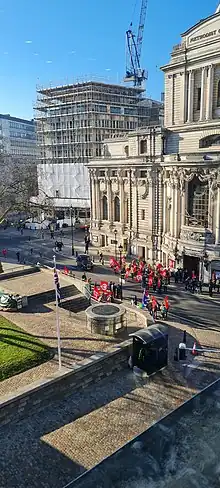Fire Brigades Union
The Fire Brigades Union (FBU) is a trade union in the United Kingdom for wholetime firefighters (including officers up to chief fire officer / firemaster), retained firefighters and emergency control room staff.
 | |
| Founded | 1918 |
|---|---|
| Headquarters | Kingston upon Thames |
| Location | |
Members | |
Key people |
|
| Affiliations |
|
| Website | www |
History
The first recorded instance of trade union organisation of firefighters was when the Municipal Employees' Association recruited several London County Council firemen in early 1905, which by the end of the following year had grown to a branch of 500.[4]
After the entire branch had transferred to the rival National Union of Corporation Workers (NUCW), the branch grew to 1,100 of the 1,300 London firemen and to protect the then branch secretary from potential dismissal, sub-officer E. W. Southgate handed over branch secretaryship to Jim Bradley, a London park-keeper who had been nominated by the union's executive.[5]
Following the strike of police officers on 29 August 1918, Bradley organised a secret ballot of firemen on the issue of strike action over pay and conditions. After winning the right to a representative board for London firemen, the fire brigade branch of NUCW seceded from the union to join the Firemen's Trade Union, what had been a friendly society for around 200 firemen in private brigades led by George Gamble, with Bradley becoming assistant secretary.[6]
In 1930, the union changed its name to the Fire Brigades Union.
Second World War
The Air Raid Precautions Act (1937) contained provisions for recruiting a volunteer force of auxiliaries to supplement existing fire brigades, which were called up on 1 September 1939. The 95,000 called up (89,000 men, 6,000 women) formed the Auxiliary Fire Service (AFS) far outnumbered the around 6,000 full-time regulars. AFS firefighters were on worse conditions, with regular firemen promoted to be their officers. The war emergency also saw the re-instatement of continuous duty service, which was dropped after a week in favour of a 112-hour week.[7]
The question of the AFS transformed the union, the incumbent leadership, headed by General Secretary Percy Kingdom, held that the AFS were dilutees and therefore should be marginalised. This view was challenged by John Horner and other young firemen and over the course of a protracted dispute which saw all the union's full-time officials resign, Horner was elected General Secretary.[8] Horner then began organising auxiliaries, winning endorsement of this at the 1940 conference of the regular section of the union and saw the union's membership increase from 3,500 in 1939 to 66,500 in 1940.[9]
As a result of the London Blitz, the fire service was nationalised in 1941 by the powers of the Fire Services (Emergency Provisions) Bill.[10]
2002–03 dispute
Led by its then General Secretary Andy Gilchrist, the union called a strike over pay and conditions in 2002, following an independent review of pay carried out by the same organisation that reviewed MPs' pay. The strike did not achieve its goals, and on 5 May 2005 a left wing candidate, Matt Wrack, defeated Gilchrist in the election for General Secretary, attaining 63.9% of the vote cast (12,883 votes) on a total turnout of about 40% of the membership.

2004 disaffiliation
The FBU disaffiliated from the Labour Party in 2004 due to the union's opposition of policies put in place by the then prime minister and party leader, Tony Blair.[11]
2013–14 dispute
In August 2013, FBU members were balloted with 78% voting in favour of industrial action, in a dispute of pensions.[12] The first strike took place on 25 September 2013 for four hours.[13] Periods of industrial action have continued throughout 2013 and 2014, when the dispute escalated with a 96-hour strike called from 31 October to 4 November 2014.[14]
2015 re-affiliation with Labour
In November 2015, the FBU re-affiliated with the Labour Party due to the union's backing of the party's new leader Jeremy Corbyn and his commitment to anti-austerity politics.[15]
2023 Dispute
On 30 January 2023 voted to go on strike, with 88% in favour of strike action, on a 73% turnout.[16] On 11 February 2023 the FBU recommended that its members accept a revised pay offer of a 7% rise backdated to July 2022 and a further 5% increase from 1 July 2023, and it postponed planned strike action for workers to vote on the offer.
Election results
The union sponsored Labour Party candidates in several Parliamentary elections.
| Election | Constituency | Candidate | Votes | Percentage | Position |
|---|---|---|---|---|---|
| 1964 general election | Oldbury and Halesowen | John Horner | 22,099 | 40.6 | 1[17] |
| 1966 general election | Oldbury and Halesowen | John Horner | 28,490 | 53.2 | 1[18] |
| 1970 general election | Oldbury and Halesowen | John Horner | 26,499 | 47.4 | 2[19] |
Officials
General secretaries
- 1918–1922 George Gamble
- 1922–1929 Jim Bradley
- 1929–1939 Percy Kingdom
- 1939–1964 John Horner
- 1964–1980 Terry Parry
- 1980–2000 Ken Cameron
- 2000–2005 Andy Gilchrist
- 2005–present Matt Wrack
Assistant general secretaries
- 1939 Harry Short
- 1946 Jack Grahl
- 1957 Tom Harris
- 1974 Dick Foggie
- 1982–2005 Mike Fordham
- 2005–2023 Andy Dark
- 2023–Present Ben Selby
Presidents
- 1939–1944 Gus Odlin
- 1944–1959 John Burns
- 1959–1964 Terry Parry
- 1964–1977 Enoch Humphries
- 1977–1979 Wilf Barber
- 1979–1986 Bill Deal
- 1986–1991 Stan Fitzsimmons
- 1991–1999 Ronnie Scott
- 1999–2002 Mick Harper
- 2002–2007 Ruth Winters
- 2007–2010 Mick Shaw
- 2011–2018 Alan McLean
- 2018–present Ian Murray
References
- "FBU: annual returns" (PDF). GOV.UK.
- "Fire Brigades Union to re-affiliate to Labour". BBC News. 27 November 2015. Retrieved 29 November 2015.
- "Firefighters have come back to Labour today because we finally found a leader worth backing in Jeremy Corbyn". The Independent. 27 November 2015. Retrieved 29 November 2015.
- Bailey, V. "The Early History of the Fire Brigades Union" In: Bailey, V. (1992), pp. 10–11
- Bailey, V. "The Early History of the Fire Brigades Union" In: Bailey, V. (1992), p. 11
- Bailey, V. "The Early History of the Fire Brigades Union" In: Bailey, V. (1992), p. 17
- Bailey, V. "The Early History of the Fire Brigades Union" In: Bailey, V. (1992), pp. 40–43
- Bailey, V. "The Early History of the Fire Brigades Union" In: Bailey, V. (1992), pp. 43–44
- Bailey, V. "The Early History of the Fire Brigades Union" In: Bailey, V. (1992), p. 45
- Bailey, V. "The Early History of the Fire Brigades Union" In: Bailey, V. (1992), pp. 54–55
- 'The union split from Labour in 2004 in opposition to Tony Blair's policies'.
bbc.co.uk
Published 27/11/15. Retrieved 29/11/15 - "Firefighters back industrial action in pensions row". BBC News. BBC. 29 August 2013. Retrieved 26 October 2014.
- "Firefighters confirm four-hour strike in England and Wales". BBC News. BBC. 17 September 2013. Retrieved 29 October 2014.
- "Firefighters announce strike on the days leading up to Bonfire Night". London Evening Standard. London Evening Standard. 24 October 2014. Retrieved 26 October 2014.
- Wrack, Matt (27 November 2015). "Firefighters have come back to Labour today because we finally found a leader worth backing in Jeremy Corbyn". The Guardian. Retrieved 29 November 2015.
- Sparrow, Andrew (30 January 2023). "Firefighters vote for first national strike in 20 years as talks to avert teacher strikes fail – as it happened". the Guardian. ISSN 0261-3077. Retrieved 15 February 2023.
- Labour Party, Report of the Sixty-Third Annual Conference of the Labour Party, pp.158-180
- Labour Party, Report of the Sixty-Fifth Annual Conference of the Labour Party, pp.308-330
- Labour Party, Report of the Sixty-Ninth Annual Conference of the Labour Party, pp.289-312
Further reading
- Bailey, Victor (ed.) (1992) Forged in Fire: the history of the Fire Brigades Union. London: Lawrence & Wishart ISBN 0-85315-750-2